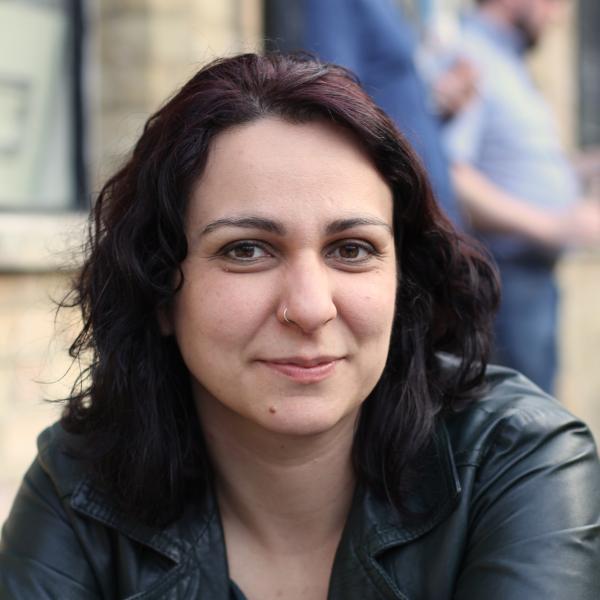Dr Valeria Vitale
School of History, Philosophy and Digital Humanities
Lecturer in Digital Humanities


Full contact details
School of History, Philosophy and Digital Humanities
9 Mappin Street
Sheffield
S1 4DT
- Profile
-
Valeria is a lecturer in Digital Humanities, specialising in the representation and reception of historical places. Prior to joining the DHI in Sheffield, she was based at The Alan Turing Institute, working on the UK-US collaboration Machines Reading Maps (2021-2022). From 2020 to 2021 she worked as Research Curator at the British Library, for the AHRC-funded Locating a National Collection project, and from 2017 to 2020 she was based at the Institute of Classical Studies in London (School of Advanced Study) where she taught Digital Approaches to Cultural Heritage. While at the ICS, Valeria was Director of Education and co-Investigator for the Mellon-funded project Pelagios 7.
In 2020 Valeria was awarded the Kathleen Kenyon fellowship by the Society for Libyan Studies to pursue her work on the Heritage Gazetteer of Libya, in collaboration with King’s Digital Lab. As part of the fellowship, she taught the Mapping Roman Libya module at UCL archaeology, experimenting with digital mapping applications as teaching and research tools.
Valeria is member of the British School at Rome's Faculty of Archaeology, History and Letters, and one of the Coordinators of the Pelagios Network (2019-2022 Chair). She is an active member of the Digital Humanities community and is one of the organisers of the Linked Pasts Symposia, the Digital Classicist London Seminars, and the Sunoikisis Digital Classics Initiative.
- Research interests
-
Valeria is particularly interested in the use of Linked Open Data and to enhance transparency and diversity in academia, and likes to explore the potential of semantic annotation as a tool for collaborative research and public engagement. During her PhD in Digital Humanities (King’s College London), she has investigated the use of Linked Open Data to document variant 3D visualisations of archaeological buildings in Pompeii, Italy. Currently, she is testing the technologies and methodologies developed within the Machines Reading Maps project on a large, varied, and multilingual corpus of digitised maps: the David Rumsey Map Collection.
More generally, Valeria’s research is focusing on the challenges of creating and maintaining historical gazetteers, the use of formalised languages to express complex knowledge around place, and the representation of historical heritage on maps.
Publications
Vitale, V. & Simon, R. (Forthcoming 2022) “Linked Data Networks: How, Why and When to Apply Network Analysis to LOD”. In Peeples, M.A., Munson, J., Mills, B. and Brughmans, T. (eds.) Handbook of Archaeological Network Research. Oxford University Press
Dunn, S. & Vitale, V. (2021) "Linking text and maps: annotation as a critical tool for teaching in the Spatial Humanities”. In Literary Geographies vol 7 n.2
Vitale, V., De Soto, P., Simon, R., Barker, E., Isaksen, L. and Kahn, R. (2021). “Pelagios–Connecting Histories of Place. Part I: Methods and Tools”. International Journal of Humanities and Arts Computing, 15(1-2), pp.5-32.
Kahn, R., Isaksen, L., Barker, E., Simon, R., de Soto, P., & Vitale, V. (2021). “Pelagios–Connecting Histories of Place. Part II: From Community to Association”. International Journal of Humanities and Arts Computing, 15(1-2), 85-100.
Del Rio, G. & Vitale, V. (2020) “Recogito in a Box. From Annotation to Digital Editions”. Modern Languages Open (1), p.44. DOI: http://doi.org/10.3828/mlo.v0i0.299
Simon, R.; Vitale, V.; Kahn, R.; Barker, E.; Isaksen L. (2020) “Revisiting Linking Early Geospatial Documents with Recogito.” In e-Perimetron. Vol.14, No.3. Available: <http://oro.open.ac.uk/68009/>
Vitale, V. & De Beer, S. (2019), “What are urban gazetteers and why do we need them?”. In EuropeanaTech Issue 12. Available: <https://pro.europeana.eu/page/issue-12-pelagios#what-are-urban- gazetteers-and-why-do-we-need-them>
Vitale, V. (2018), “The Monster in your Pocket”. In Bridges, E. and Al Ayad, D. (eds.) Making Monsters. London: Institute of Classical Studies and Futurefire.net. Available: <https://sas-space.sas.ac.uk/9287/>
Vitale, V. (2016) “Transparent, Multivocal, Cross-disciplinary: The Use of Linked Open Data and a Community-developed RDF Ontology to Document and Enrich 3D Visualisation for Cultural Heritage.” In Bodard, G. & Romanello, M. Digital Classics Outside the Echo-Chamber: Teaching, Knowledge Exchange and Public Engagement. London: Ubiquity Press. Available: <http://dx.doi.org/ 10.5334/bat.i>
